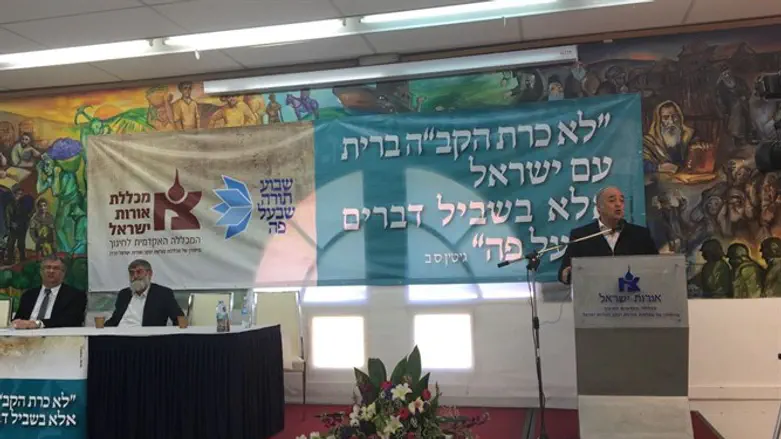
Several years ago, during one of my sabbaticals, our family lived in a large North American city where I taught at a well known university. The city boasted a large Jewish community and several Religious Zionist synagogues.
One day, a new rabbi arrived in the community, sent by an established Israeli rabbinic placement organization. The new spiritual leader was an example of the best Religious Zionism has to offer, a graduate of a yeshiva high school and hesder yeshiva, a native Israeli talmid chacham who had combined the 'sefer (book,ed.) and the sword' as an intrepid officer in the IDF paratroopers' brigade. It seemed as if he was going to present the best possible model of Religious Zionism.
As the High Holydays approached, the community came in droves to hear him speak, but it turned out that he was incapable of uttering a single correct English sentence. He could not express himself at all, resorting desperately to waving his hands and the use of common Hebrew words like "teshuva" and "shofar" interspersed with a smattering of English. It was pitiful to witness, but far from unusual. Most graduates of the Religious Zionist school system, including those who have attended the sector's most prestigious educational institutions, are unable to express themselves adequately in English.
This is the reason Education Minister Naftali Bennett and Religious Public Education head Dr. Avraham Lifschitz have been investing so much effort in training English teachers for the religious and secular public school systems. They understand that there is a real problem.
Religious Zionist young adults are front runners in many fields, from the IDF to education, industry and scientific endeavor, but have a hard time elucidating religious Zionism's vision of the Jewish State and explaining the ethos of Religious Zionism in English that is clear enough to draw the interest of our English speaking brothers overseas.
While I was in America, I witnessed the strong desire of Diaspora Jewry to be exposed to that vision, to the thoughts of the great leaders of Religious Zionism, Rabbi Avraham HaKohen Kook and his students, heads of hesder yeshivas and of Religious Zionist yeshivas producing the highest level of Torah scholars. However, there are very few young Israelis capable of inspiring listeners with the living Torah of Religious Zionism.
This is a terrible weakness on our part. Something drastic must be done immediately to improve the study of English in our yeshiva high schools, ulpanas and religious study frameworks.
How do we go about it? The answer lies in training superior English teachers. It is imperative, for example, that Orot Teachers College, the largest religious teachers training college in Israel, invests in creating an English teaching curriculum that transforms the study of the language through innovation, creativity and the choice of relevant subject matter that can grasp the attention of the Religious Zionist student. This is one of the most important goals I set for myself upon accepting the position of college president.
This year, for the first time, the Orot men's Rechovot campus offers a trailblazing teacher training program for yeshiva students who have chosen to become English teachers. We are spearheading a real revolution here. Charged with turning wonderful young men, filled with the learning they have absorbed and continue to absorb in the yeshiva world, into high school Talmud and elementary school Jewish studies educators, we have begun a groundbreaking program that offers them the opportunity to become English teachers as well. A Talmud teacher who can teach English sends a powerful message to his students. He is a "significant other" who can turn studying English in yeshiva high schools into something relevant, central and important.
At the Orot women's campus in Elkana, Dr. Vitale Arzi, head of the Department of English Language Education, has developed a unique program called "The Holy and the Secular." The program blends the various academic disciplines connected to English (literature, linguistics, language teaching) with an emphasis on Jewish themes, while imparting the vision and values of religious Zionism to students in the college's English teacher's department.
While doing their student teaching, these young women create original and unique learning centers focused on the Religious Education Ministry's annual theme or on one chosen by the particular school in which they have been placed. Their emphasis is on experiential and inter-disciplinary teaching that makes use of all the language skills needed to master English. These learning centers form a central part of student teaching, adding significantly to our graduate's ability to develop original materials as they go out into the field.
I believe that this is the way to turn our wonderful youth into emissaries who can impart the beautiful, unique Torah of the Land of Israel, to use Rabbi Kook's expression, in clear and well-chosen words that will find their way into the hearts of our brothers in the Diaspora.